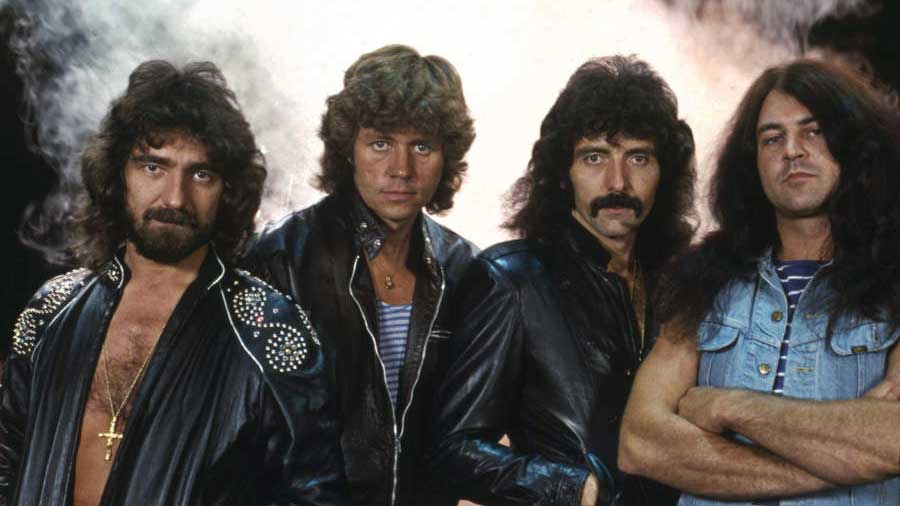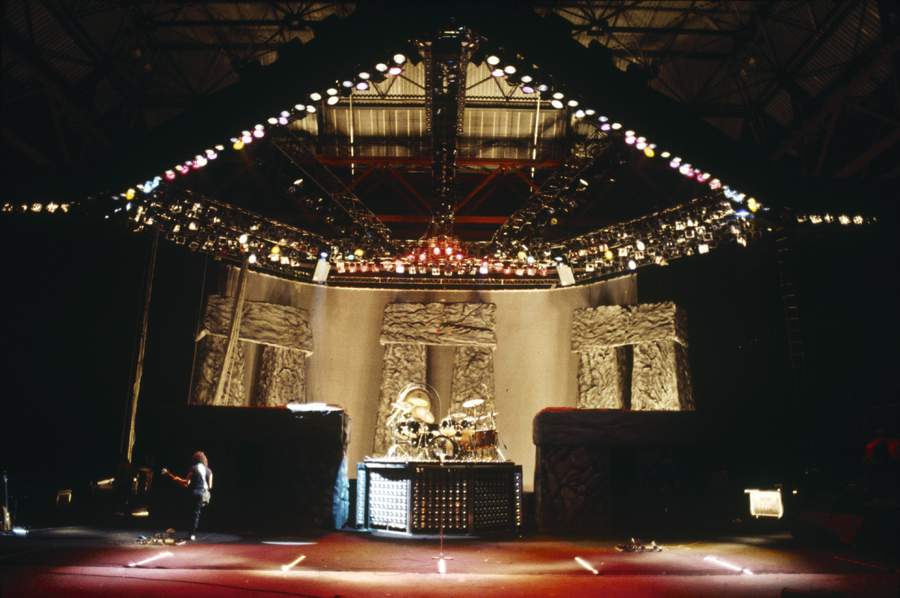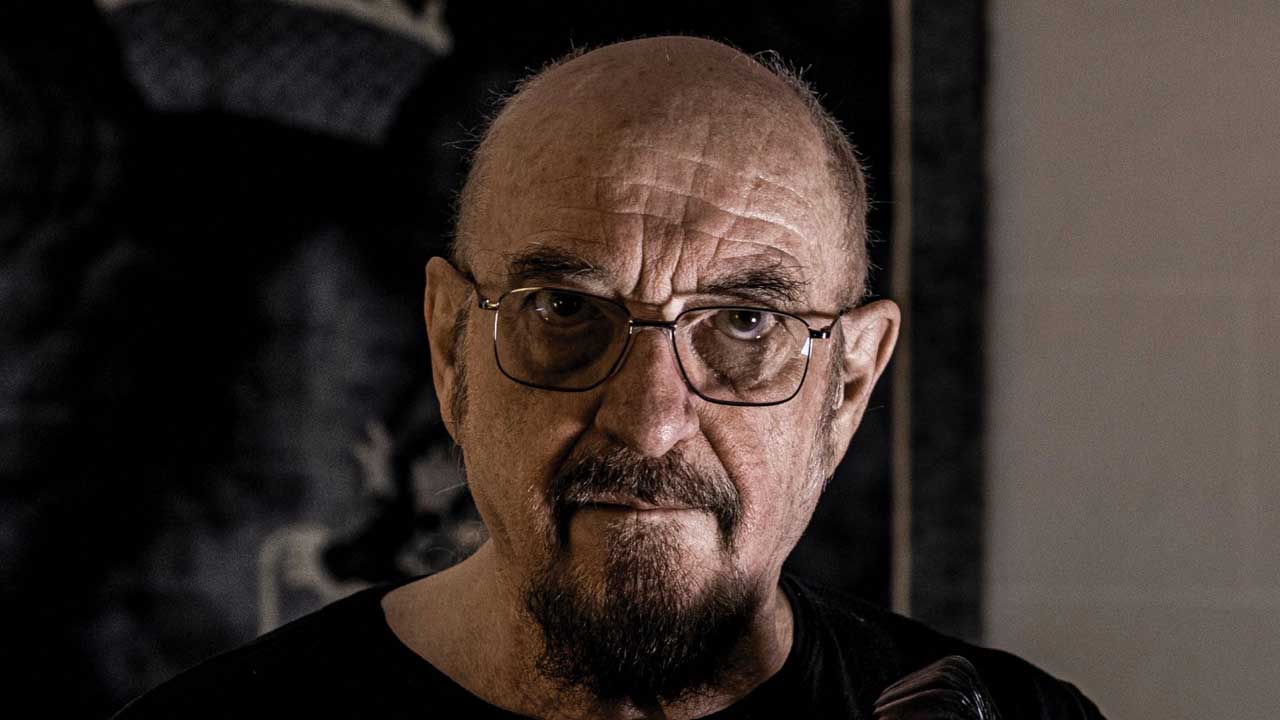New vocalists lasted five minutes and founder members quit amid the chaos: 1984 was an awful year for Black Sabbath, and by its end they were almost obliterated
Molotov cocktails and member mayhem: The chaotic story of Black Sabbabth's worst year

By the end of their Born Again tour, in March 1984, Black Sabbath were in a career death spiral. Having pulled off the previously thought impossible – successfully replacing singer Ozzy Osbourne, with former Rainbow vocalist Ronnie James Dio – they made a giant misstep when replacing Dio with former Deep Purple frontman Ian Gillan.
Dio had bent over backwards trying to maintain the integrity of the band, and the two Sabbath albums he recorded (Heaven And Hell in 1980 and Mob Rules in ’81) both restored the band’s musical credibility and returned them to platinum-selling status in America. Gillan, by contrast, admitted he had never even liked Sabbath’s music. That was brought home by his unwillingness to even learn the lyrics of classic Sabbath numbers like War Pigs; he had the words to the songs scrawled on the pages of a scrapbook concealed behind his vocal monitors.
When, during their debut UK show at the Reading Festival in August 1983, Sabbath encored with the old Purple warhorse Smoke On The Water, there was disbelief, then disdain, then ridicule. It later emerged that they had also considered playing Purple’s Black Night. More astonishingly, with ELO’s Bev Bevan having become the latest drummer to replace Bill Ward, at short notice, guitarist Tony Iommi (at Bevan’s quiet urging) had actually suggested they have a crack at ELO’s Evil Woman. “But every time Iommi counted it in, it would make us all fall about laughing!” recalled Sabbath’s keyboard player Geoff Nicholls.

The world tour, stretched over seven excruciating months, would become legendary for all the wrong reasons. A week before Reading, bassist Geezer Butler narrowly avoided arrest when he threw a Molotov cocktail from his hotel room window, destroying another guest’s Ford Cortina. Three weeks after Reading, cops were called to a fight at a club in Barcelona, begun after the bouncers took exception to Gillan ‘jokingly’ setting fire to one of their waiters. Running to escape the mass brawl, Butler was arrested after jumping into the back of a police car, mistaking it for a taxi.
The most eye-wateringly embarrassing aspect of the Born Again tour, though, was the stage set. Ostensibly built around the portentous two-minute instrumental Stonehenge, the stone models were so huge they couldn’t fit them into more than a handful of venues. “The bloody things were forty-feet high,” Gillan snorted.
Adding to the sense of the absurd, they had a dwarf dressed as the red devil-baby on the Born Again sleeve. The dwarf was told to crawl atop the Stonehenge pillars, before falling backwards with a scream onto (unseen) a pile of safety mattresses. A tolling bell was then the cue for a parade of roadies dressed as monks to drift across the stage, as if in prayer. At the very first show, Gillan recalled, when “the dwarf-baby fell backwards his screams didn’t stop. Someone had forgotten to put the mattresses out! I was looking out from the side of the stage and you could see people turning to each and going: ‘What the fuck?’”
That ludicrous situation was made immortal when producers of the film This Is Spinal Tap, released as the Born Again tour finally ended, spoofed it in reverse when the fictitious Tap discover their Stonehenge models have been built so small that a dwarf towers over them.
Sign up below to get the latest from Classic Rock, plus exclusive special offers, direct to your inbox!

When it was announced at the start of 1984 that Gillan would be leaving Sabbath after the tour in order to participate in a full-on Deep Purple reunion that summer, a sense of betrayal was added to the growing realisation that Sabbath were becoming a joke.
Gillan feigned astonishment. “Myself, Tony and Geezer all knew that once the world tour was over I would be teaming up with Deep Purple… The Purple thing was always there from day one and pretty much on schedule for when I came out of Sabbath. It all slotted in very nicely, as it happens.” He added: “We all parted on amicable terms.”
Not quite. Butler, who now insisted that it was never part of their original plan to call the hookup with Gillan Black Sabbath, publicly accused the singer of staying just long enough to raise his profile in America before rejoining Purple. Disillusioned and depressed, Butler also threatened to leave the band.
Only Iommi, stone-faced and coked-out, was prepared to try to keep the show on the road. The last original Sabbath member still standing, he was now living in a penthouse apartment on Sunset Boulevard with his new girlfriend, former Runaways guitarist and now solo artist Lita Ford. They had begun an affair when Ford supported Sabbath on some of the Born Again dates and had moved in together in 1984.
Despite the guitarist still being married to his second wife, Melinda, with whom he’d had a daughter, Toni, in 1983, then split from soon after, Iommi now proposed to Ford, who accepted and began making plans for a wedding in which the bride would be resplendent in a black wedding dress. She even made an album, with Iommi producing, tentatively titled The Bride Wore Black, but it was never released.
Ford was not a coke fiend like Iommi. “It was a shame,” he admitted, “because I messed up the relationship by being constantly out of it.” He knew he’d gone too far, he said, when he and Sabbath’s keyboard player Geoff Nicholls were writing in the penthouse one day and decided they should chain the front door and place furniture up against it, “because you get paranoid when you do a lot of coke. We were working on this song when we heard a loud bang. It was Lita.”
When Iommi later invited Ford’s regular drummer Eric Singer to join Sabbath, it was the last straw. They split soon after.
Back in April ’84, with drummer Bill Ward fresh out of rehab and Butler reluctantly agreeing to return too, the search for a new singer was back on. This time, instead of moving for an established star singer – before calling on Gillan they had approached and been turned down by both Robert Plant and David Coverdale – they invited hopefuls to send in tapes, which Iommi and Butler would then listen to, and invite any that really stood out to come for an audition. This led to the farcical situation of one singer who, Iommi recalled, “we thought was amazing” being invited on the strength of a tape that, it turned out, he didn’t actually sing on.
“We were in the rehearsal room,” Iommi remembers. “Me and Geezer are looking at each other going: ‘What’s this? This guy can’t sing! But he sounded so good on the tape!’” It wasn’t until later, when they played back the cassette, that their prospective new singer informed them that it wasn’t actually his voice on the tape, and that they’d been listening to the wrong side of the cassette.
Next it was announced on MTV that 24-year old American singer/guitarist Ron Keel was the new singer in Black Sabbath. Another mistake. According to Keel: “I demoed some of the material and we hung out for a few days. They went through a bunch of other singers, but all they really wanted was Ozzy.”
Finally, in May 1984, they thought they’d found The One when a 30-year-old former male model named David Donato auditioned. Tall, toned, LA-tan, with long ringlets of hair running down his back, if he sounded as good as he looked he was in, Iommi decided.
Unfortunately he didn’t, his voice somewhere between a downscale Dio and an asthmatic Gillan. Donato looked better than either of them, though, and was significantly younger, and Iommi felt coke-confident enough to schedule a full-scale announcement of Donato’s appointment as Sabbath’s new singer, via a soon to be notorious interview with Kerrang! featuring a spread of glamour shots of a pouting, hair-teased Donato, who told the writer: “It all seems to be going very smoothly. I always had a picture of what the right singer in Sabbath should be – and it was me!”
A month later, Donato was out of the band. Embarrassed, Iommi then claimed he’d never really been in it. “The Donato thing never should have gone that far,” he said.“We went public before we were sure about it.”
The October 18th 1984 issue of KERRANG breaks the incredibly sad news that Black Sabbath have parted ways with singer, David Donato 😢Wait... who? #rock #mystery pic.twitter.com/MG08nRqcGyOctober 18, 2023
It didn’t really matter what had happened, the fallout from the Donato debacle was intense. “Everything turned into chaos,” Iommi said.
That chaos escalated still further when Bill Ward – yet again – walked out, vowing that this time it was for good. “I had the same feelings I’d had when Ronnie and Ian were in the band,” he later explained. “It just didn’t feel the same as it had with Ozzy. I knew there was no way back.”
When Butler, exasperated by the shambles, followed Ward out the door, it seemed like that was it.
“Geezer had been writing stuff that didn’t sound like Sabbath at all and he was just fed up and wanted to try that stuff out somewhere else,” Iommi claimed, trying to save face.
When Butler then began shopping around a demo he’d made with David Donato to major labels, it only brought more confusion to the increasingly bedraggled Sabbath saga.
Even hard man Iommi now began to falter, no matter what Geoff Nicholls might have told him as they sat there at Tony’s penthouse doing coke all day and night and writing songs for a Sabbath album the guitarist now knew in his bones was not going to happen.
By the end of 1984, Iommi was working with 34-year-old singer Jeff Fenholt, who’d starred in the title role of the original Broadway production of Jesus Christ Superstar. Some of their demo material would later surface as finished Sabbath tracks – but with Fenholt’s voice and lyrics excavated.
It was later claimed that Fenholt – who soon after “found God” and became a TV evangelist – was forced to drop out of the project after becoming conflicted with the band’s supposedly ‘satanic’ image. Fenholt countered those claims by suggesting it was a row with Sabbath manager Don Arden that almost led to the pair brawling that spurred his exit. Again, Iommi attempted to cover his tracks by insisting Fenholt was never a fully fledged Sabbath member.
The toxicity surrounding the Sabbath name was such that they would spend the remainder of the 80s reduced to a blur of line-ups, a string of forgettable albums, and the end of their viability as a touring act in the US.
Rubbing salt into the wound was the huge success in 1984 of all three of Sabbath’s former singers. Ozzy’s Bark At The Moon album, released in November 1983, was another multiplatinum hit, his ’84 US tour, with newbies Mötley Crüe in support, the most lucrative of his career. Sales of Dio’s The Last In Line, released in July, also left Sabbath in the dust. Even Ian Gillan’s album with Deep Purple, Perfect Strangers, outdid Sabbath by some distance, hitting the US Top Five in December
Far from born again, Sabbath now appeared to be dead. But, as the following 40 years have proved, appearances can be deceptive…
Mick Wall is the UK's best-known rock writer, author and TV and radio programme maker, and is the author of numerous critically-acclaimed books, including definitive, bestselling titles on Led Zeppelin (When Giants Walked the Earth), Metallica (Enter Night), AC/DC (Hell Ain't a Bad Place To Be), Black Sabbath (Symptom of the Universe), Lou Reed, The Doors (Love Becomes a Funeral Pyre), Guns N' Roses and Lemmy. He lives in England.

